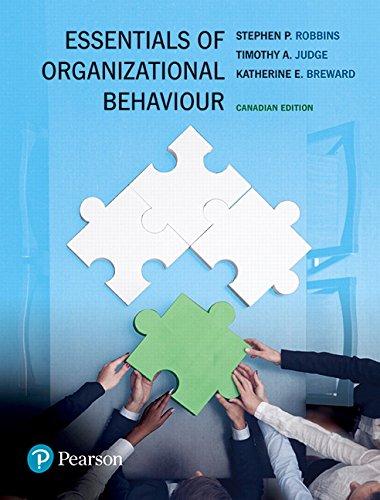Perceived groups norms, role fulfillment, and status can combine in toxic ways, as a Hydro employee discovered
Question:
Perceived groups norms, role fulfillment, and status can combine in toxic ways, as a Hydro employee discovered when he was fired in May 2015 for behaviour that occurred off the job at a Toronto sporting event.
Sports news reporter Shauna Hunt was attempting to interview Toronto Football Club (TFC) fans after a game. Television cameras were rolling and a small group of men could be seen huddling in the background, giggling. Eventually one of the men interrupted Ms. Hunt’s interview by grabbing the microphone and shouting a vulgar and sexually aggressive phrase that has been abbreviated in the media as FHRITP.
The “FHRITP” phenomenon started in response to a staged video that went viral online. It featured actors playing the roles of interviewer and interviewee when their interview is interrupted by someone yelling
“FHRITP.” Many people did not realize the original video was faked. A toxic norm quickly developed in which real reporters at real sporting events, particularly female reporters, were targeted with the offensive phrase while they were working. Reporters in places as varied as England, the United States, and Canada all reported frequent interruptions, with some female routinely reporting several instances a day.
This is the environment Shauna Hunt worked in and one day she said
“enough.” Instead of ignoring the interruption and starting her interview again she turned to the group cheering on her harasser and asked them if they also planned to harass her and why they thought the behaviour was acceptable. The television camera, meanwhile continued to roll. Sean Simoes responded to her questions, laughing and defending the FHRITP practice. He told Ms. Hunt that she was lucky she was not experiencing even more aggressive and physical forms of harassment and said that FHRITP was “awesome.”
The footage was posted on the Internet and went viral. The harassers were quickly shamed online, the story received widespread mainstream news coverage, and within days Hydro Ontario announced that they were firing Simoes for violating the company’s ethical guidelines. Simoes later send a private message to Shauna Hunt apologizing for his behaviour.
Males have historically enjoyed a privileged status in Western society, one that still echoes today. Norms around sexual harassment have changed significantly in the past 40 years and many things that used to be considered harmless or common, such as catcalling or casually touching women in public places, are now recognized as inappropriate harassment that is part of a wider rape culture. Elements of patriarchal privilege still remain embedded in society, though, especially in contexts that are stereotypically considered highly masculine, such as professional sporting events. It is worth noting that the FHRITP phenomenon overwhelmingly targeted women reporters in general and sports reporters in particular—
women infringing on traditionally male domains.
Simoes clearly felt that his defence of FHRITP was socially acceptable. He endorsed the practice loudly and vigorously in a crowded public place, when he knew television cameras were recording him. Yet clearly he misjudged. Once the video went viral, it became clear that a large part of society, including his employer, did not in fact support this norm.
Simoes’s apology, which gained him little political traction due to its private nature, suggests that he himself may have found his behaviour inappropriate on reflection. It seems unlikely that Simoes would have indulged in similar behaviour at work, with family, or in other social contexts. For example, if he saw a reporter covering a traffic accident it is unlikely he would attempt to grab the microphone or defend interruptions and sexual harassment. What was so different about the TFC game?
Sources: J. Armstrong, “MLSE Willing to Ban Anyone Yelling FHRITP near Facilities,” Global News
(May 12, 2015), http://globalnews.ca/news/1993793/mlse-willing-to-ban-anyone-yelling-fhritpnear-
facilities; R. Levinson King, “Bystander Calls FHRITP Incident at TFC Offensive,” Toronto Star
(May 13, 2015), accessed July 25, 2015 at http://www.thestar.com/news/gta/2015/05/13/
bystander-calls-fhritp-incident-at-toronto-fc-match-offensive.html; J. Hathaway, article in Gawker, January 2, 2015, accessed July 25, 2015 at http://gawker.com.
Discussion Questions 1. How might group norms and role fulfillment have led Simoes to believe that his behaviour during this incident was okay?
2. Discuss how power and status influenced norm development for the FHRITP “community.” Put another way, how might being a male sports fan in 2015 have influenced Simoes’s perceptions of acceptable behaviour?
3. Discuss how power and status influenced norm development for the reporting community. Put another way, how might being a female sports reporter in 2015 have influenced Shauna Hunt’s decision to publically shame her harassers? What does this decision tell us about evolving gender norms?
Step by Step Answer:

Essentials Of Organizational Behaviour
ISBN: 9780134182971
1st Canadian Edition
Authors: Stephen P. Robbins, Timothy A. Judge, Katherine Breward





